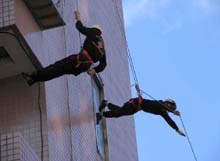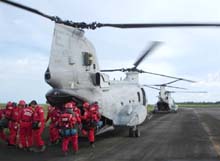Byline:JIM HWANG
Publication Date:07/01/2007
International Headquarters SAR Taiwan works with the US military in the Philippines last year. (Courtesy of the International Headquarers SAR Taiwan)
At every disaster scene, there are always SAR teams from the private sector, giving their services to save lives.
Whether they are natural or man-made, Taiwan is never short of disasters. At the scenes of many, in addition to government rescue services, non-governmental search and rescue (SAR) teams are to be seen. "Our role, as stated in the Red Cross Society Act of the Republic of China, is to assist the government during war, disaster and under all situations," says Daniel Chen, Deputy Director of the Red Cross Society's Disaster Relief and Voluntary Services Department and a voluntary emergency medical technician who has served with Taipei City's fire department since 1980.
In May, the Red Cross Society set up three urban rescue teams in northern, central and southern Taiwan and organized 25 disaster relief and preparedness centers around the island, equipped with food and medical supplies. Chen points out that almost all Taiwan's urban rescue projects and training began after the September 21, 1999 earthquake. The cabinet-level National Disaster Prevention and Protection Commission and the Taipei City Urban Search and Rescue Team, for example, were both set up in the wake of the quake. "The loss of lives and property sent a clear message that Taiwan was not prepared--especially in urban rescue situations--when a major disaster struck," Chen says. "It was not only an alarm bell for the government but also one that motivated non-governmental organizations to rethink how we could be better prepared in times of emergency."
Hard Training
Members of the Red Cross SAR teams need to be basic or intermediate emergency medical technicians, qualified to assess a patient's condition and manage respiratory, cardiac and trauma emergencies. They will then complete 128 hours of training with the Taipei City Urban Search and Rescue Team. Currently, more than 300 Red Cross volunteers have completed the training, the best of which were then sent to the US Federal Emergency Management Agency to undergo three weeks of advanced training. "The major difference is the mindset," says Wang Cheng-hua, who has been a Red Cross volunteer since 1976 and is now deputy leader of the Red Cross's northern Taiwan SAR team. Before receiving urban rescue training, Wang had participated in many mountain and water-rescue missions. "On those missions, the rescue team itself is relatively safe, but that's not the case when going into a collapsed building," he says. "You are not helping if you get yourself trapped or buried there, so you need to take every precaution to keep yourself safe in order to do the job."
Though new to urban rescue, Taiwan's private sector is experienced in other critical situations. Lu Cheng-tsung, commandant of International Headquarters SAR Taiwan, explains that since the 1980s, with the speeding up of Taiwan's economic development, people have had more money and more time for leisure activities but frequently lack the knowledge to keep themselves from danger. When disasters happened, many rescue operations were undertaken not by professional rescue services but by private groups with some particular expertise. Mountaineering clubs and aboriginal guides did a lot of mountain rescue work, while fishermen, familiar with the sea and Taiwan's rugged coast, did the same in maritime emergencies. But the costs of compensating such rescue parties--for their expenses and the work they lost, when on the rescue mission--were frequently more than the victims' families could shoulder. "It was a heavy burden while the families already had enough to worry about," Lu says. "We had the skills and some equipment the US Seventh Fleet left us, so we organized ourselves and got started."
International Headquarters SAR Taiwan, founded in 1981, was the first private rescue operation in Taiwan. Since its establishment, it has never asked for any financial recompense for any of its missions. The money needed for operations, administration and equipment mostly comes from annual membership fees of NT$2,100 (US$64) per person. For major disasters, charity groups may provide assistance in the form of money, food and other supplies, while airline companies usually offer free flights for international missions.
The organization now has about 13,000 voluntary members in its 87 units around Taiwan. The volunteers usually provide help in their own areas, staying in contact with local police and fire departments and volunteering their aid when situations occur. Help can be called in from other areas if necessary.
Branching Out
When International Headquarters SAR Taiwan was first established, members were mostly retired military personnel who had picked up necessary skills during their service. Lu himself was an officer responsible for mountain operations and survival training, and there are members from the Navy's SAR unit. But now members are from all walks of life. "The environment, the architectural structure and the equipment have all been changing," Lu says. "Search and rescue is now an operation that requires professionals from different areas." Military-grade sonar and members who were familiar with its use, for example, were particularly helpful during a rescue mission in 2002, following the crash of a China Airlines passenger jet into the sea near Penghu.

The equipment used in search and rescue operation has been changing rapidly: A Red Cross SAR team trains on descending skills. (Courtesy of the Red Cross Society, ROC)
In addition to their annual fees, SAR members also need to pay for their training and uniforms. In return, they get to risk their lives from time to time and have less time with their families. Why sign up? "I can't tell you why, but I can't think of any reason why not, either," says Liu Jyun-cheng. "I guess I just enjoy it for no reason." Liu has been in International Headquarters SAR Taiwan for five years, and is now the leader of an emergency response unit.
The Red Cross, with better finance from domestic and international sources, pays for members' training programs, transportation and uniform. But whoever foots the bill, it is no easy task to become a properly qualified SAR team member. And to remain qualified, attending frequent drills, undergoing retraining and staying in good physical shape can be burdensome. "The training and exercises are tough, both physically and mentally," Chen says. "Those who are willing to undergo the training and work like dogs to pass it definitely forge bonds with the SAR ethos."
Eagerness and hard work, however, is not always enough. Both the Red Cross and International Headquarters SAR Taiwan suffer a high turnover rate among their volunteers. Lu thinks that the deciding factor is the economy. "When it's up, people have steady jobs and can afford to take a few days off for drills or training or to answer duty calls," he says. "But when people need to work all day and make barely enough, they don't really have much choice, no matter how much they want to stay." Taiwan's economy has been sluggish in recent years, and the impact of this has been strengthened because many people have moved abroad to work. But Chen is more optimistic about the situation. Of those who can no longer be formal members of the SAR organizations he says: "They've been trained and have the skills, so they are capable and will be doing what we will be doing when situations occur. The only difference is they are not wearing the uniform."
Coordinating the Coordinators
While they might wear different uniforms, private SAR teams always work together. The first team on a scene sets up a coordination center, evaluates the situation and organizes the work until the task can be handed over to government officials. Sometimes the system does not work smoothly. "The problem is that there are all levels of government officials from all kinds of agencies," Lu says. "Sometimes it gets to the point where politicians instead of rescue professionals are conducting the operation." Take a maritime rescue, for example. From the beach to the scene, agencies responsible for fisheries, tourism and transportation, the coast guard and even the Navy are all involved. Coordination among them can be hugely complicated.

International Headquarters SAR Taiwan went to the Philippines, to give back some of the aid Taiwan has received from overseas during its own disasters. (Courtesy of the International Headquarers SAR Taiwan)
Lu thinks that the private sector should give the government a little push. He cites Taiwan's telecommunications market as an example. When it was a government monopoly, people needed to wait for at least a year to get a cell phone number. But when there are competitors from the private sector, the government telecom company not only became speedy in approving applications but also lowered prices. "In addition to assisting the government, NGOs should also serve as a competitor," he says. "Healthy competition pushes people to improve themselves."
Rebecca Lin, the Red Cross's international and public affairs director, thinks that the government should outsource overall command of disaster rescue work to an NGO in the manner of Japan and the United States. "In times of emergency, the government only needs to get hold of that one organization instead of trying to reach them all and dispatch them one by one," she says. "Besides, setting up an agency to deal with all NGOs is much more expensive than commissioning just one of them to handle the task." In fact, after the 1999 earthquake, the Red Cross, drawing on experience from its international partners and Taiwan's unique situation, worked out a guidebook and a trainer's toolbox in disaster preparedness, response and organization development. The Red Cross has been giving copies to relevant government agencies and NGOs and holding seminars to win consensus on establishing a coordinated system. The response, however, has not been encouraging. "It seems we are the only enthusiastic party," Lin says.
International Presence
In addition to helping out in domestic catastrophes, the Red Cross and International Headquarters SAR Taiwan have also been working internationally. The Red Cross, for example, has held two training camps on disaster preparedness and response for Red Cross members from areas struck by the 2004 tsunami, while International Headquarters SAR Taiwan has helped out in Thailand in the aftermath of the 2004 tsunami, in Central El Salvador following earthquakes there, and in the Philippines after mudslides devastated several villages. Lu sees these as chances for Taiwan to give back some of the help it has received after the earthquake in 1999. Sharing this belief, SAR teams from Taiwan are always extremely hard-working. Lu recalls that, after a mission in the Philippines, the operation commandant, a US Marine officer, told Lu that he could not understand why the Taiwan team always worked like they were obsessed, though he certainly admired it. "Taiwan usually contributes in monetary form, but telling the victims that you've brought only money and a loving heart is not enough and often embarrassing," he says. "In these situations, the help most needed is skills that can save lives, and that's where we come in."
Locating and rescuing survivors is the biggest accomplishment for any SAR team. On the scene of a major disaster, however, chances of finding survivors are often slim and the main task is bagging bodies. "That's something we have to deal with and, quite frankly, the easier part of it," Lu says. "The really tough part is finding a victim who was not killed on the spot but died waiting for rescue, because you will always wonder: had you dug a little faster or come a little sooner, could you have saved a life?" And it is, of course, this dread of not coming in time that pushes all SAR teams to rush to the scene and dig, as fast and as deep as they can.
|
|


